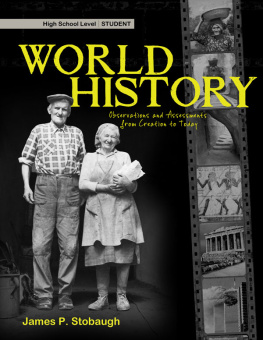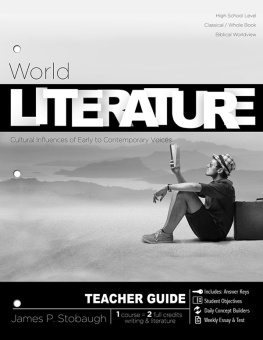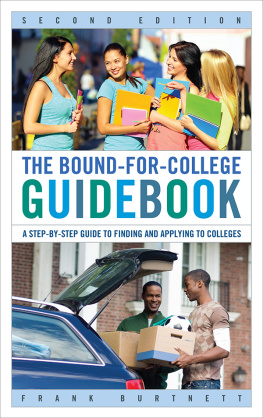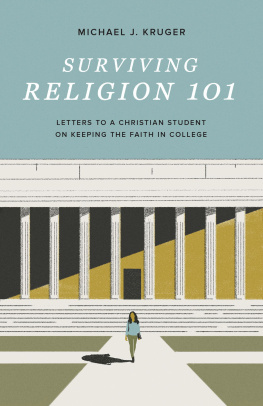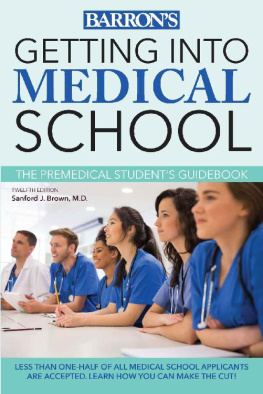First printing: January 2012
Copyright 2011 by James P. Stobaugh. All rights reserved. No part of this book may be used or reproduced in any manner whatsoever without written permission of the publisher, except in the case of brief quotations in articles and reviews. For information write:
Master Books , P.O. Box 726, Green Forest, AR 72638
Master Books is a division of the New Leaf Publishing Group, Inc.
ISBN: 978-0-89051-639-3
Library of Congress: 2011944158
Scripture quotations taken from the New International Version of the Holy Bible, copyright 1973, 1978, 1984 by the International Bible Society.
Quotes from Greek Morphemes Lessons and Latin Morphemes Lessons, by Alene Harris, PhD, are used by permission.
Select portions of the Introduction and Lessons 13, 14, 19, 20, 21, 22, 24, 26, 28, 35, 41, and 48 are used courtesy of the Enhanced Edition of the SAT & College Preparation Course for the Christian Student by James P. Stobaugh (Green Forest, AR: Master Books, 2011).
Images are from Shutterstock, Clipart, Dreamstine, Library of Congress, and J.P. Stobaugh.
Please consider requesting that a copy of this volume be purchased
by your local library system.
Printed in the United States of America
Please visit our website for other great titles:
www.masterbooks.net
For information regarding author interviews,
please contact the publicity department at (870) 438-5288
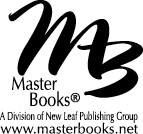
This book is gratefully dedicated to my wife,
Karen Elizabeth Stobaugh
North? North is there, my love.
The brook runs west.
West-running Brook then call it.
(West-Running Brook men call it to this day.)
What does it think ks doing running west
When all the other country brooks flow east
To reach the ocean? It must be the brook
Can trust itself to go by contraries
The way I can with you and you with me
Because were were I dont know what we are.
What are we?
From West-Running Brook, Robert Frost
The author wishes to thank Mr. Daniel Greenridge and John Braswell for their help in the math and science sections. Likewise, the author wishes to thank the editorial staff at New Leaf Publishing Group, especially Mr. Craig Froman and Ms. Judy Lewis.
Contents
Introduction: Come to
mt. moriah
Come to Mt. Moriah, young people, where God demands everything and nothing must be taken for granted. The ACT is a great opportunity, but first, join me on Mt. Moriah!
Hebrews 11:17 (the first commentary on Geneis 22) says, By faith Abraham, when God tested him, offered Isaac as a sacrifice. He who had received the promises was about to sacrifice his one and only son. This man Abraham was called by God into the Promised Land. And he went. He was promised many descendants. And he waited even into his nineties. And God gave him a son... but now he must go to Mt. Moriah.
Dr. William Willimon tells of a congregant who said to him one day, I am looking for another church because when I look at that God, the God of Abraham, I feel Im near a real God, not the sort of dignified business-like... God we chatter about here on Sunday mornings. Abrahams God could blow a man to bits, give and then take a child, ask for everything from a person and then want more. I want to know that God.
Do you know that God? A God who means business? Not some existential reality grounded in warm fuzzy feelings, but a God who brings chills up your spine. Not the God whom we meet on the silver screen, full of maudlin aphorisms, who can barely manage happy endings.
No, the God on Mt. Moriah is the God Abraham meets in Genesis 22, the God Moses meets in Exodus 3 in the bush that is on fire but does not burn, the God who does not make polite conversation. This is the God who struck Annais and Shappirah dead for their lying and intrigue. This is the God who Abraham meets this day. This is the God who is leading you in this new century, in this post-Christian world. He means business, young people.
This is the God you will meet in this ACT preparation book.
How much does your God demand of you? Come to Mt. Moriah, where God demands everything. I am not kidding around, young people. God demands everything from you. This course demands everything from you.
This is even a different God from the one Abraham thought he knew. God had called him into the wilderness and he had gone. And God took care of him. He had come through with a child when none seemed available. But this was something new, this command of God to go to Mt. Moriah. Perhaps we, too, have known God to be our savior, our friend, our companion and He is all these but I wonder if we have known a God who demands everything from us.
God is not to be trifled with. You are asked, now, in this course, to devote everything you have and more to prepare to be the next generation of godly leaders. This is serious business your work for the next 50 lessons.
Abraham knew that God is not safe, not to be controlled, not to be mocked or tampered with. He knew that God was God. And Abraham intended to treat Him that way.
This faith to which Abraham is called and for which he is celebrated particularly in the New Testament means the acknowledgment of a particular God. A God who means business. Who calls us to Mt. Moriah. Abraham trusts in a God who can violate religious conventions, shatter normal definitions of reality, and bring about newness. Isaac long anticipated, finally given is suddenly demanded back, and he is the embodiment of the newness God can bring to us. To us. To a people who know only three cars and two color TVs and affluence. To a people who really know only barrenness. This God who calls us to Mt. Moriah has no parallel, no analogy. This God we serve is not predictable, not safe, and not controllable. He loves whom He wants to love even those whom we cannot forgive. He saves those whom He chooses. He is a God who cannot be controlled by our minds, our political situations, or our religions.
On Mt. Moriah God brings something new a young ram. He does not merely patch up what is old. He makes something entirely new. And on Mt. Moriah we find that all that we once believed, all that once demanded our allegiance, has come in question.
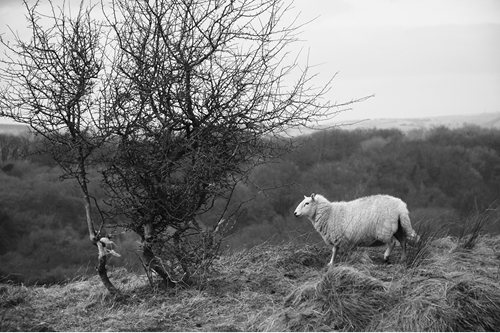
The theologian Walter Brueggemann, in his exposition of this passage, challenges us to embrace the God on Mt. Moriah. The modern world that so celebrates freedom also believes that present life is closed and self-contained in known natural laws, just waiting to be uncovered. In this world there can be no real change, no newness. But our world is not after all a human artifact; it is created by God. And He shall not be thwarted by our puny efforts to control Him. Abraham knew that our world needs more than a faith whose only claim is that its God can be served without cost. No! The God on Mt. Moriah wants everything we have. This God we serve is determined to have His own way with us, no matter what the cost.
When Abraham comes down from Mt. Moriah he is a new man. God has demanded all and Abraham has delivered. God provides a substitute, but that is incidental. This faith of Abraham is replicated throughout history. Moses foolishly stands before Pharaoh and demands that he let Gods people go. Moses has been to his Moriah. Shadrach, Meshak, and Abednego have been to Moriah, too. During the Babylonian captivity they are told to worship the Persian king. They refuse. They might be burned alive in the fire. The God we serve is able to save us from it, and he will rescue us from your hand, O king. But even if he does not, we want you to know, O king, that we will not serve your gods or worship the image of gold you have set up, they defiantly tell the king (Daniel 3:1718). They have met a God who demands everything and then more. They have been to Moriah.



